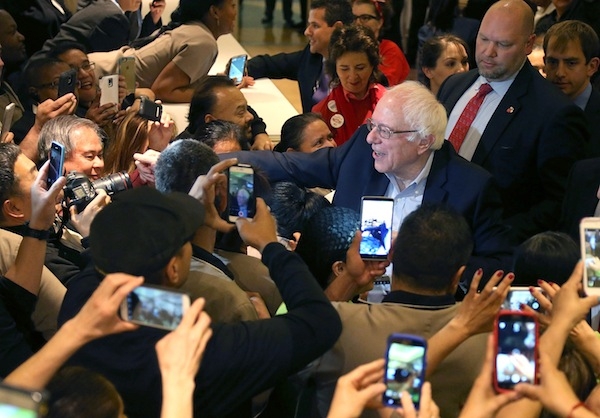Three things give momentum to a campaign for a presidential nomination in the USA and power it to victory: Expectations. Expectations. Expectations.
The only truly memorable moment of Bill Clinton’s 1992 Democratic victory was his New Hampshire primary loss: where his second-place finish surprised the political establishment and lent him the ‘comeback kid’ moniker than turbo-charged his campaign. In 2004, the Kerry campaign had to go so far as hush up the fact they knew they were going to win the Iowa caucuses for months prior to the vote in order to pull off a ‘shock win’. The impact of John McCain’s New Hampshire primary win in 2008 was the fact he trailed Mitt Romney by 18 points just a month before.
And Team Hillary have been playing the expectations game for months. As early as July last year, Nate Silver reported that they were talking up Sanders’ in Iowa and New Hampshire. The statistical guru broadly agreed with their premise: pointing to the fact that only Sanders’ beloved Vermont had a higher proportion of ‘white liberals’ in its primary electorate – that these states ‘aren’t representative of the more diverse electorates that Democrats will turn out elsewhere’. Former Howard Dean campaign manager and Clinton supporter Joe Trippi wrote in late January that ‘if Sanders wins Iowa and New Hampshire, that tells us he can win unusually liberal whites and whites from a neighbouring state — that’s it. And if Iowa is close… all that really tells us is that it’s likely to be close with unusually liberal whites in other states.’
Fine. Easy. These are Sanders people. Not Hillary people. Within a minute of (as a certain New York tycoon might put it) Clinton’s schlonging by Sanders in New Hampshire, her campaign manager issued a statement saying that the former Secretary of State would do better in states that ‘better reflect the true diversity of the Democratic Party and the nation’.
Indeed, it was exactly this goal to ‘diversify the nominating process’ that Nevada Senator Harry Reid claimed as justification for his successful 2007 drive to have his state installed as one of the four early contests. The western state, which caucuses today, has a large Hispanic population, a significant veterans community and strong trade unions, especially in the hospitality sector. It is dominated by the entertainment meccas of Las Vegas and Reno – a far cry from the farms and hamlets of Iowa and New Hampshire. Nate Silver ranks the ‘Silver State’ (no relation) as 37th on his tally of ‘white liberals’ – and furthermore calculated that even if the candidates were tied in national vote share, which according to some polls is the case, Clinton would still win Nevada by 3 points. She beat Barack Obama here by twice that in 2008.
This is a high stakes game for both camps – and the spin has already begun. Polls have narrowed in recent weeks, with anecdotal reports pointing to a surge for Sanders among younger Hispanic caucus-goers. A well-placed Nevada Democrat told me that Clinton support in the state felt like “a cupboard made of flan.” So if Iowa and New Hampshire’s lack of diversity was the key factor in Clinton’s poor performances in the contests so far, what would be the argument for a disappointing Nevada finish?
Strained answer: the same. Team Hillary have gone on record this week with the claim that, whatever people’s impressions, 80% of Democratic caucus-goers on Saturday will be white. Some have highlighted the fact that the 11am caucus is great for students and seniors, but less so for those who have to work or sleep during the day, such as those who work the casinos or hotels, who skew Hispanic and – it is supposed – are more pro-Hillary. Moreover, the caucus format is thought to favour Bernie Sanders and his highly motivated movement. But many in the state Democratic Party have pooh-poohed this notion that this was anything other than diverse fertile territory for Mrs Clinton, with a source close to Senator Reid telling Politico that ‘it sounds like the Clinton team is worried about another embarrassing result’. This seems closer the mark.
If Sanders runs Clinton close, or even wins, in Nevada, he will no longer be a candidate simply for white rural northern liberals – Vermonters outside Vermont, if you like. Indeed, it would then appear that the basis for his support in the early states is more than pure demographics: put simply, these are the voters that have been most exposed to his candidature and message, an effect that will be replicated in other states, amplified by the momentum of success early in the race.
Despite his fundraising prowess and the vast movement behind him, the mainstream media have so far shied away from presenting Bernie Sanders as a truly realistic nationwide candidate for the presidency. By tonight, all that could have changed – and for the second time in eight years, Team Clinton could justifiably engage in a little panic.






Comments